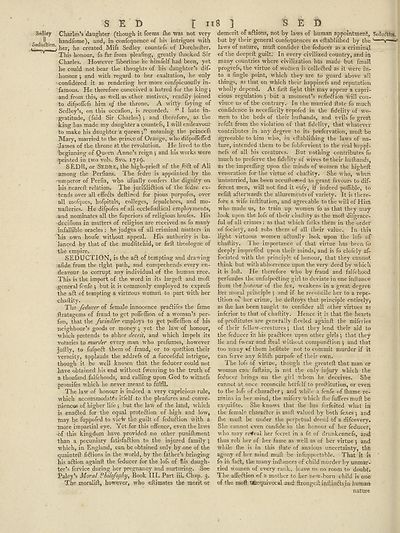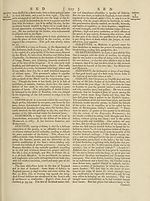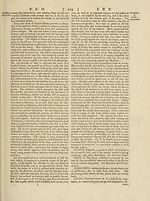Encyclopaedia Britannica, or, a Dictionary of arts, sciences, and miscellaneous literature : enlarged and improved. Illustrated with nearly six hundred engravings > Volume 19, Scripture-SUG
(128) Page 118
Download files
Complete book:
Individual page:
Thumbnail gallery: Grid view | List view

S E D [ I
Secllcy Charles’s daughter (though it feems (he was not very
II handfome), and, in confequence of his intrigues with
^ecu ion. jier^ jie createci Mifs Sedley countefs of Dorchefter.
This honour, fo far from pleafing, greatly fhocked Sir
Charles. However libertine he himfelf had been, yet
he could not bear the thoughts of his daughter’s dif-
honour j and with regard to her exaltation, he only
confidered it as rendering her more confpicuoully in¬
famous. He therefore conceived a hatred for the king;
and from this, as well as other motives, readily joined
to difpofiefs him of the throne, A witty faying of
Sedley’s, on this occafion, is recorded, “ I hate in¬
gratitude, (faid Sir Charles) ; and therefore, as the
king has made my daughter a countefs, I will endeavour
to make his daughter a queen meaning the princefs
Mary, married to the prince of Orange, who difpoflelTed
'James of the throne at the revolution. He lived to the
beginning of Queen Anne’s reign ; and his works were
printed in two vols. 8vo. 171$.
SEDR, or SEDKE, the high-prieft of the feft of All
among the Perfians. The fedre is appointed by the
• emperor of Perfia, who ufually confers the dignity on
his neared relation. The jurifdiftion of the fedre ex¬
tends over all effe£ts deftined for fnous purpofes, over
all mofques, hofpitals, colleges, fepulchres, and mo-
naderies. He difpofes of all ecclefiadical employments,
and nominates all the fuperiors of religious houfes. His
decifions in matters of religion are received as fo many
infallible oracles : he judges of all criminal matters in
'Jus own houfe without appeal. His authority is ba¬
lanced by that of the muddtehid, or fird theologue of
the empire. v ,
SEDUCTION, is the aft of tempting and drawing
afide from the right path, and comprehends every en¬
deavour to corrupt any individual of the human race.
This is the import of the word in its larged and mod
general fenfe ; but it is commonly employed to exprefs
the aft of tempting a virtuous woman to part with her
chadity.
The feducer of female innocence praftifes the fame
ftratagems of fraud to get polfedion of a woman’s per-
fon, that the /windier employs to get poffedion of his
neighbour’s goods or money ; yet the law of honour,
which pretends to abhor deceit, and which impels its
votaries to murder every man who prefumes, however
judly, to fufpeft them of fraud, or to quedion their
veracity, applauds the addrefs of a fuccefsful intrigue,
though it be well known that the feducer could not
have obtained his end without fwearing to the truth of
a thoufand falfehoods, and calling upon God to witnefs
promifes which he never meant to fulfil.
The law of honour is indeed a very capricious rule,
which accommodates itfelf to the pleafures and conve¬
niences of higher life ; but the la\v of the land, which
is enafted for the equal proteflion of high and low,
may be fuppofed to vieiv the guilt of feduffion with a
more impartial eye. Yet for this offence, even the laws
•of this kingdom have provided no other punifhment
than a pecuniary fatisfaftion to the injured family ;
which, in England, can be obtained only by one of the
quainted fictions in the world, by the father’s bringing
his action againd the feducer for the lofs of his daugh¬
ter’s fervice during her pregnancy and nurturing. See
Paley’s Moral PhilofopJiy, Book III. Part iii. Chap. 3.
The moralid, however, who edimates the merit or
8 ] S E D
demerit of addions, not by laws of human appointment, Sedu&M
but by their general confequences as edablithed by the ^ ^
laws of nature, mud condder the feducer as a criminal
of the deeped guilt. In every civilized country, and iq
many countries where civilization has made but fmall
progrefs, the virtue of women is collected as it were in¬
to a fingle point, which they are to guard above all
things, as that on which their happinefs and reputation
wholly depend. At fird fight this may appear a capri¬
cious regulation ; blit a moment’s reflection 'ivill con¬
vince us of the contrary. In the married date fo much
confidence is neceflarily irepofed in the fidelity of wo¬
men to the beds of their hufbands, and evils fo great
redflt from the violation of that fidelity, that whatever
contributes in any degree to its prefervation, mud be
agreeable to him who, in edablidiing the laws of na¬
ture, intended them to be fubfervient to the real happi-
nefs of all his creatures. But nothing contributes fo
much to preferve the fidelity of wives to their hufbands,
as the imprefling upon the minds of women the higheft
veneration for the virtue of chadity. She who, when
unmarried, has been aecudomed to grant favours to dif¬
ferent men, will not find it eufy, if indeed poflible, to
refid afterwards the allurements of variety. It is there¬
fore a wife iriditution, and agreeable to the will of Him
who made us, to train up women fo as that they may
look upon the lofs of their chadity as the mod disgrace¬
ful of all crimes : as that which firiks them in the order
of fociety, and robs them of all their value. In this
light virtuous women actually look upon the lofs of
chadity. The importance of that virtue has been fu
deeply impreffed upon their minds, and is fo clofely af-
fociated with the principle of honour, that they cannot
think but with abhorrence upon the very deed by which
it is lod. He therefore who by fraud and falfehood
perfuades the unfulpe&ing girl to deviate in one indance
from the honour of the fex, weakens in a great degree
her moral principle ; and if he reconcile her to a repe¬
tition ojc her crime, he dedroys that principle entirely^
as die has been taught to condder all other virtues as
inferior to that of chadity. Hence it is that the hearts
of proditutes are generally deeded againd the miferies
of their fellow-creatures; that they lend their aid to
the feducer itl his practices upon other girls; that they
lie and fwear and deal without compunction ; and that
too many *)f them hefitate not to commit murder if it
can ferve any felfilh purpofe c>f their own.
The lofs of virtue, though the greated that man or
woman can fudain, is not the only injury which the
feducer brings on the girl whom he deceives. She
cannot at once reconcile heiftlf to proditution, or even
to the lofs of charadler; and while a fenfe of Ihame re¬
mains in her mind, the mifery which die differs mud be
exquifite. She knows that die has forfeited what in
the female character is mod valued by both fexes; and
fhe mud be under the perpetual dread of a difeovery.
She cannot even confide in the honour of her feducer,
vdio may repeal her fecret in a fit of drunkennefs, and
thus rob her of her fame as well as of her virtue ; and
while die is in this date of anxious uncertainty, the
agony of her mind mud be infupportable. That it is '
fo in fact, the many indances of child murder by unmar¬
ried women of every rank, leave us no room to doubt.
The affection of a mother to her new-born child is one
of the mod tt&equivocal and ftrongeit inftin&s in human
nature
Secllcy Charles’s daughter (though it feems (he was not very
II handfome), and, in confequence of his intrigues with
^ecu ion. jier^ jie createci Mifs Sedley countefs of Dorchefter.
This honour, fo far from pleafing, greatly fhocked Sir
Charles. However libertine he himfelf had been, yet
he could not bear the thoughts of his daughter’s dif-
honour j and with regard to her exaltation, he only
confidered it as rendering her more confpicuoully in¬
famous. He therefore conceived a hatred for the king;
and from this, as well as other motives, readily joined
to difpofiefs him of the throne, A witty faying of
Sedley’s, on this occafion, is recorded, “ I hate in¬
gratitude, (faid Sir Charles) ; and therefore, as the
king has made my daughter a countefs, I will endeavour
to make his daughter a queen meaning the princefs
Mary, married to the prince of Orange, who difpoflelTed
'James of the throne at the revolution. He lived to the
beginning of Queen Anne’s reign ; and his works were
printed in two vols. 8vo. 171$.
SEDR, or SEDKE, the high-prieft of the feft of All
among the Perfians. The fedre is appointed by the
• emperor of Perfia, who ufually confers the dignity on
his neared relation. The jurifdiftion of the fedre ex¬
tends over all effe£ts deftined for fnous purpofes, over
all mofques, hofpitals, colleges, fepulchres, and mo-
naderies. He difpofes of all ecclefiadical employments,
and nominates all the fuperiors of religious houfes. His
decifions in matters of religion are received as fo many
infallible oracles : he judges of all criminal matters in
'Jus own houfe without appeal. His authority is ba¬
lanced by that of the muddtehid, or fird theologue of
the empire. v ,
SEDUCTION, is the aft of tempting and drawing
afide from the right path, and comprehends every en¬
deavour to corrupt any individual of the human race.
This is the import of the word in its larged and mod
general fenfe ; but it is commonly employed to exprefs
the aft of tempting a virtuous woman to part with her
chadity.
The feducer of female innocence praftifes the fame
ftratagems of fraud to get polfedion of a woman’s per-
fon, that the /windier employs to get poffedion of his
neighbour’s goods or money ; yet the law of honour,
which pretends to abhor deceit, and which impels its
votaries to murder every man who prefumes, however
judly, to fufpeft them of fraud, or to quedion their
veracity, applauds the addrefs of a fuccefsful intrigue,
though it be well known that the feducer could not
have obtained his end without fwearing to the truth of
a thoufand falfehoods, and calling upon God to witnefs
promifes which he never meant to fulfil.
The law of honour is indeed a very capricious rule,
which accommodates itfelf to the pleafures and conve¬
niences of higher life ; but the la\v of the land, which
is enafted for the equal proteflion of high and low,
may be fuppofed to vieiv the guilt of feduffion with a
more impartial eye. Yet for this offence, even the laws
•of this kingdom have provided no other punifhment
than a pecuniary fatisfaftion to the injured family ;
which, in England, can be obtained only by one of the
quainted fictions in the world, by the father’s bringing
his action againd the feducer for the lofs of his daugh¬
ter’s fervice during her pregnancy and nurturing. See
Paley’s Moral PhilofopJiy, Book III. Part iii. Chap. 3.
The moralid, however, who edimates the merit or
8 ] S E D
demerit of addions, not by laws of human appointment, Sedu&M
but by their general confequences as edablithed by the ^ ^
laws of nature, mud condder the feducer as a criminal
of the deeped guilt. In every civilized country, and iq
many countries where civilization has made but fmall
progrefs, the virtue of women is collected as it were in¬
to a fingle point, which they are to guard above all
things, as that on which their happinefs and reputation
wholly depend. At fird fight this may appear a capri¬
cious regulation ; blit a moment’s reflection 'ivill con¬
vince us of the contrary. In the married date fo much
confidence is neceflarily irepofed in the fidelity of wo¬
men to the beds of their hufbands, and evils fo great
redflt from the violation of that fidelity, that whatever
contributes in any degree to its prefervation, mud be
agreeable to him who, in edablidiing the laws of na¬
ture, intended them to be fubfervient to the real happi-
nefs of all his creatures. But nothing contributes fo
much to preferve the fidelity of wives to their hufbands,
as the imprefling upon the minds of women the higheft
veneration for the virtue of chadity. She who, when
unmarried, has been aecudomed to grant favours to dif¬
ferent men, will not find it eufy, if indeed poflible, to
refid afterwards the allurements of variety. It is there¬
fore a wife iriditution, and agreeable to the will of Him
who made us, to train up women fo as that they may
look upon the lofs of their chadity as the mod disgrace¬
ful of all crimes : as that which firiks them in the order
of fociety, and robs them of all their value. In this
light virtuous women actually look upon the lofs of
chadity. The importance of that virtue has been fu
deeply impreffed upon their minds, and is fo clofely af-
fociated with the principle of honour, that they cannot
think but with abhorrence upon the very deed by which
it is lod. He therefore who by fraud and falfehood
perfuades the unfulpe&ing girl to deviate in one indance
from the honour of the fex, weakens in a great degree
her moral principle ; and if he reconcile her to a repe¬
tition ojc her crime, he dedroys that principle entirely^
as die has been taught to condder all other virtues as
inferior to that of chadity. Hence it is that the hearts
of proditutes are generally deeded againd the miferies
of their fellow-creatures; that they lend their aid to
the feducer itl his practices upon other girls; that they
lie and fwear and deal without compunction ; and that
too many *)f them hefitate not to commit murder if it
can ferve any felfilh purpofe c>f their own.
The lofs of virtue, though the greated that man or
woman can fudain, is not the only injury which the
feducer brings on the girl whom he deceives. She
cannot at once reconcile heiftlf to proditution, or even
to the lofs of charadler; and while a fenfe of Ihame re¬
mains in her mind, the mifery which die differs mud be
exquifite. She knows that die has forfeited what in
the female character is mod valued by both fexes; and
fhe mud be under the perpetual dread of a difeovery.
She cannot even confide in the honour of her feducer,
vdio may repeal her fecret in a fit of drunkennefs, and
thus rob her of her fame as well as of her virtue ; and
while die is in this date of anxious uncertainty, the
agony of her mind mud be infupportable. That it is '
fo in fact, the many indances of child murder by unmar¬
ried women of every rank, leave us no room to doubt.
The affection of a mother to her new-born child is one
of the mod tt&equivocal and ftrongeit inftin&s in human
nature
Set display mode to:
![]() Universal Viewer |
Universal Viewer | ![]() Mirador |
Large image | Transcription
Mirador |
Large image | Transcription
Images and transcriptions on this page, including medium image downloads, may be used under the Creative Commons Attribution 4.0 International Licence unless otherwise stated. ![]()
| Permanent URL | https://digital.nls.uk/192696946 |
|---|
| Attribution and copyright: |
|
|---|
| Description | Ten editions of 'Encyclopaedia Britannica', issued from 1768-1903, in 231 volumes. Originally issued in 100 weekly parts (3 volumes) between 1768 and 1771 by publishers: Colin Macfarquhar and Andrew Bell (Edinburgh); editor: William Smellie: engraver: Andrew Bell. Expanded editions in the 19th century featured more volumes and contributions from leading experts in their fields. Managed and published in Edinburgh up to the 9th edition (25 volumes, from 1875-1889); the 10th edition (1902-1903) re-issued the 9th edition, with 11 supplementary volumes. |
|---|---|
| Additional NLS resources: |
|

